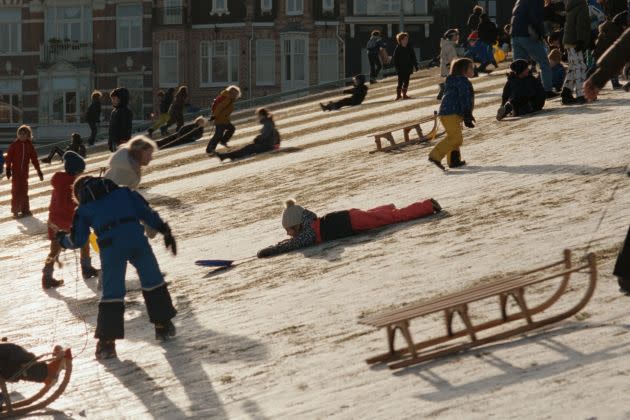Steve McQueen Calls ‘Occupied City’ A “Reminder Of What’s At Stake” In Current Political Climate As Holocaust Doc Screens At New York Film Festival

Director Steve McQueen said his unusual four-hour Holocaust documentary shot in Amsterdam is rooted in his strong sense that “the past is present” in physical manifestations all around us, as well as a reminder to stay vigilant.
“It’s very cliche, but we have to not forget. Because see what’s happening now in the politics of the world…things are shifting to the right. And if anything, you know, your book, this film, hopefully can be a reminder of what’s at stake, and it’s freedom,” the director of 12 Years A Slave and upcoming Blitz said Sunday as the film screened at the New York Film Festival. The book refers to ‘Atlas of an Occupied City, Amsterdam 1940-1945’ by Bianca Stigter, McQueen’s wife, a filmmaker (Three Minutes: A Lengthening) and historian. Her Atlas is a compedium of addresses around the city where Nazi atrocities unfolded during World War II with descriptions of each. The couple lives in Amsterdam with their children. McQueen shot the film around the city over nearly three years, ending up with 36 hours of footage edited into just over four. There’s no archival footage but shots of building exteriors, parks, public gardens, underpasses, a girl’s school, a theater and other locations, some since demolished, that were sites of interrogation and execution. Instead, the camera lingers on modern day city dwellers going about their lives in the same spots.
More from Deadline
Some 60,000 of Amsterdam’s Jews were deported to concentration camps during the war as a strong Dutch Nazi party collaborated with occupying Germans. Holland deported more Jews proportionally (70%) than any other Western European nation and very few survived.
“I don’t know if it’s a documentary. I don’t know if it’s a feature film. I don’t know if it’s art. I don’t know what the hell I was doing. I was not interested in the whole idea of framing the film as any kind of genre. All I wanted to do was to allow Bianca’s text to bring us to someplace, was to discover what we could discover in the moment of now, but reflecting on the past,” he said during a Q&A with Stigter and NYFF artistic director Dennis Lim.
“At the end of the day, we didn’t know what we were going to get. And it was just a lot of faith in the process, and the film.”
The doc premiered at Cannes. A24, which co-financed the film with New Regency, has domestic rights. Deadline review here.
He said the concept had been percolating for years. “I remember walking on the street with Bianca when I first met her, and asking her, ‘What’s this monument for?’ And it was basically a monument [on a site] where Nazi soldiers executed members of the resistance…So that sort of shocked me, it really kind of gave me a bit of a shudder. And then to discover that my daughter’s school and where kids were jostling, you know, putting their rucksacks into their lockers, this actual space, was where the SS had this sort of interrogation center.”
Stigter, who is from Amsterdam, said her book focused particularly on “where the perpetrators were.” The Atlas is more like a guide book with picture and maps, street by street, neighborhood by neighborhood. The film is more a “wandering through the city.”
On the length of the movie, which is shown with an intermission, McQueen said, “It’s about time, it’s about the weight of the subject. It deserves no less. This couldn’t be an hour-and-a-half movie, because it just had to have the weight of time.”
“It’s more of an experience than a history lesson. And it doesn’t matter…if you wander off sometimes,” added Stigter.
Best of Deadline
SAG-AFTRA Interim Agreements: Full List Of Movies And TV Series
2023 Premiere Dates For New & Returning Series On Broadcast, Cable & Streaming
Sign up for Deadline's Newsletter. For the latest news, follow us on Facebook, Twitter, and Instagram.

